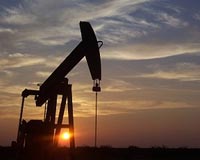 |
Moscow (AFP) Nov 20, 2009 Thawing permafrost caused by global warming is costing Russian energy firms billions of dollars annually in damage control and shrinking Russia's territory, Greenpeace warned in a new study Friday. According to the report by the environmental watchdog, up to 55 billion roubles (1.9 billion dollars) a year is spent on repairs to infrastructure and pipelines damaged by changes in the permafrost in western Siberia. "For Russia, the biggest threat of the permafrost melt is to oil and gas company infrastructure," said Vladimir Chuprov, who heads Greenpeace's energy programme in Russia. He said that the group had consulted with experts at gas giant Gazprom in writing its report, which detailed the destruction to infrastructure such as pipelines caused by rising temperatures and resulting melt water. "These are people who see what is happening and are already feeling the economic consequences of it," he told reporters in Moscow. Russia's main raw export industries are spread across the Siberian permafrost, which makes up over 60 percent of its territory and includes 20 cities and several hundred thousand people. The permafrost thaw has accelerated in recent years and Russia is now shrinking by 30 square kilometres (12 square miles) per year as icey territory disappears from the coastline, one of the authors of the report, Oleg Anisimov, warned. "It's not only an economic and infrastructure problem but a geopolitical one. It means the loss of Russian territory," said Anisimov, a senior researcher at the State Hydrological Institute in Saint Petersburg. "It's a simple observable fact that in the last decade the coastline retreat has sped up by five or six times." Anisimov and other experts spoke defensively as many Russian establishment scientists do not believe in global warming. Some say Russia may even profit from better weather thanks to climate change. Another Greenpeace study author Sergei Kirpotin said that the greatest threat of the permafrost melt may be that it powerfully accelerates global warming by unlocking billions of tonnes of the potent greenhouse gas methane. Methane is some 20 times more efficient than carbon dioxide in trapping solar heat, experts say. "Before we saw marshlands just as wasteland but in recent years scientists have realized that the Siberian swamplands have a large climate-regulating role," said Kirpotin, from the Tomsk State University in Siberia. "It is like a methane bomb threat in our north.... There is the feeling that this bomb figuratively speaking could explode." In a complex cycle, permafrost melts at the edges of lakes that previously were iced over year-round, he explained. Organic material -- the remains of rotted plants and long-dead animals -- then melt into the lake from the soil and decompose to form methane. With the thaw, the methane bubbles to the surface and is released into the atmosphere. Greenpeace said it plans to present its study to Russian President Dmitry Medvedev in a meeting on November 23, ahead of a UN climate summit next month. Russia has said it was ready to cut its greenhouse gas emissions by 20 to 25 percent by 2020 from 1990 levels, raising its target from 15 percent, ahead of the summit in Copenhagen on December 7-18. Share This Article With Planet Earth
Related Links Powering The World in the 21st Century at Energy-Daily.com
 New Evidence Supports 19th Century Idea On Formation Of Oil And Gas
New Evidence Supports 19th Century Idea On Formation Of Oil And GasWashington DC (SPX) Nov 12, 2009 Scientists in Washington, D.C. are reporting laboratory evidence supporting the possibility that some of Earth's oil and natural gas may have formed in a way much different than the traditional process described in science textbooks. Their study is for the ACS' Energy and Fuels, a bi-monthly publication. Anurag Sharma and colleagues note that the traditional process involves biology: Prehi ... read more |
|
| The content herein, unless otherwise known to be public domain, are Copyright 1995-2009 - SpaceDaily. AFP and UPI Wire Stories are copyright Agence France-Presse and United Press International. ESA Portal Reports are copyright European Space Agency. All NASA sourced material is public domain. Additional copyrights may apply in whole or part to other bona fide parties. Advertising does not imply endorsement,agreement or approval of any opinions, statements or information provided by SpaceDaily on any Web page published or hosted by SpaceDaily. Privacy Statement |